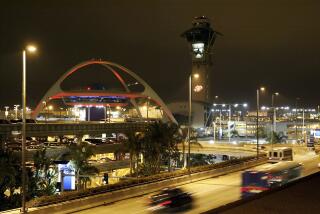Central Parking Knows People Need Space
- Share via
NASHVILLE, Tenn. — Monroe J. Carell Jr.’s father had to talk him into giving up his $12,000-a-year electrical engineering job and joining his fledgling parking lot company 31 years ago.
It turned out father really knew best.
Central Parking Corp. has grown to become the largest commercial parking lot operator in the country and Carell, today the chairman and chief executive, is now worth more than $550 million.
“It was a very, very small operation. If I’d understood how small it was I never would have come” home, Carell said with a laugh. “I took a pay cut to do it.”
From a single lot in Nashville, Central Parking has grown to nearly 2,500 parking lots with more than 1 million spaces in 80 cities in 34 states, the District of Columbia, Canada, Puerto Rico, the United Kingdom, Ireland, Spain, Germany, Malaysia, Chile and Mexico.
The company, which had $383 million in revenue last year, operates lots at baseball stadiums for the Atlanta Braves, St. Louis Cardinals, Colorado Rockies and New York Yankees, as well as lots at New York’s Madison Square Garden and Rockefeller Center, Heathrow International Airport in London and Kuala Lumpur City Centre in Malaysia.
“They’re very good at what they do,” said Mark Hughes, an analyst with SunTrust Equities Securities Corp. “The business itself isn’t very exciting, but it’s a very consistent business. Year in and year out, people have got to come in and park.”
More than 1.5 million people park their cars in Central Parking spaces every day. And the company is looking to increase that number.
Central Parking wants to acquire the nation’s second-largest parking company, Allright Holdings of Houston. The $585-million deal would nearly double the number of lots Central Parking controls to 4,700.
The merger is getting a hard look from federal regulators, but Carell remains hopeful the deal will go through this spring.
Monroe Carell Sr. and Roy Dennis started Central Parking in 1959 after retiring from NC&STL; Railroad. They grew slowly, starting with the one Nashville lot and adding 14 others, many at railroad stops, in the eight years before Carell Jr. joined them.
When he started, the younger Carell didn’t know much about parking lots, but he did know business formulas. He created one for the company: hire college graduates as managers, have them wear suits, pay them well and make them perform. He still sticks to it.
Central Parking grades managers every six months. If they get an “A”, they’re scheduled for promotion and a “B” means they need to improve. A “C” means their managerial qualities are reevaluated, and they may be let go.
Carell bought out his father and partners in the late 1970s because he wanted to grow the company more rapidly and take advantage of regional building booms. “We followed the stick cranes across the country,” he said.
When construction slowed in the 1980s, Carell changed strategies and concentrated on what he calls “takeaways”--grabbing parking lot management contracts from competitors.
In the early 1990s, ownership of the garages that Central Parking managed began to change from real estate developers to investment trusts and other financial institutions.
They wanted the parking lot manager to handle upkeep on the lots. Central Parking had previously only staffed the lots and left maintenance to the owners. To get the necessary capital to cover the added costs, Carell took the company public in 1995 and started buying competitors.
Central Parking’s stock traded at more than $50 a share in July but has lost about 40% of its value in recent months to trade at about $30.
One reason for the drop is the volatile stock market that has hurt many other small capitalization stocks, said Daniel McKinley of J.C. Bradford & Co.
Carell is now looking beyond parking lots. The company has contracts to run the Georgia 400 toll road into Atlanta, and to manage parking meters in Charlotte, N.C.; Richmond, Va.; and Fort Myers, Fla.
More to Read
Inside the business of entertainment
The Wide Shot brings you news, analysis and insights on everything from streaming wars to production — and what it all means for the future.
You may occasionally receive promotional content from the Los Angeles Times.










